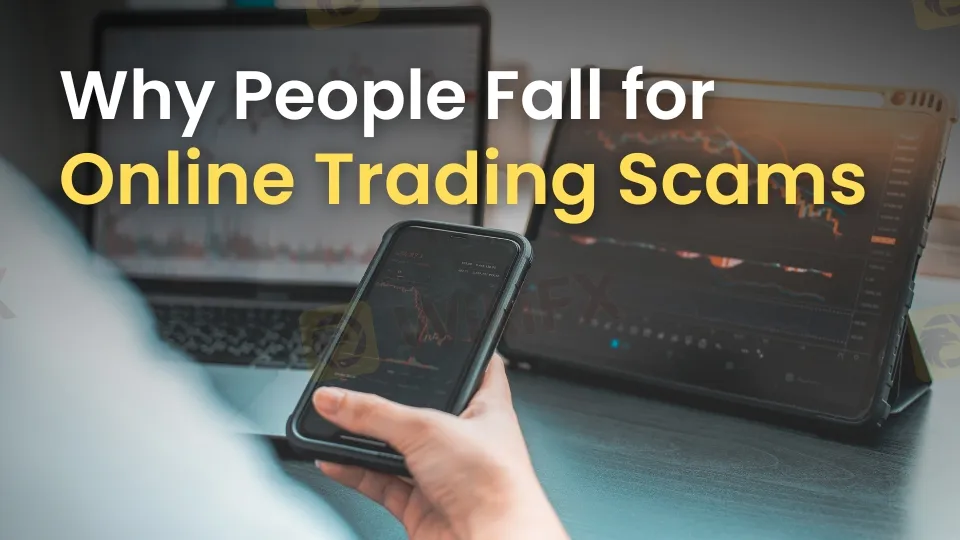Top Forex Brokers Offering Free Demo Accounts
Access demo accounts from top forex brokers. Practice trading risk‑free and explore platforms before investing.
简体中文
繁體中文
English
Pусский
日本語
ภาษาไทย
Tiếng Việt
Bahasa Indonesia
Español
हिन्दी
Filippiiniläinen
Français
Deutsch
Português
Türkçe
한국어
العربية
Abstract:Learn why people fall for online trading scams, common tactics used by scammers, psychological triggers, red flags, and how to protect yourself from fraud.

The internet today makes it easy for anyone to try growing their money through trading. Its exciting to think about turning a small amount into a big profit from your phone or computer. But this ease comes with a catch—online trading scams are everywhere. These scams trick people who want to make smart investments, using their dreams and trust against them. They can look like fake emails or pretend trading sites that promise big money with almost no chance of losing.
To stay safe, it helps to know how these scams work and why theyre so good at fooling people. This article will break down the tricks scammers use, the feelings they play with, and simple ways to spot trouble before it gets you.
Common Tactics Used in Online Trading Scams
Scammers are sneaky and have lots of ways to pull people in. One big trick is saying you‘ll get rich fast. They’ll put up ads or websites that shout things like “Make millions in a month!” These promises grab your attention and make you think you‘ve found a secret to success that others don’t know about.
Another move they use is fake proof. They show made-up stories from “happy customers” who say they got rich quickly. Sometimes they even pretend famous people back their ideas to make them look real. It‘s all a lie to make you believe it’s safe to jump in.
There‘s also something called a Ponzi scheme. Here, scammers take money from new people to pay the older ones, so it looks like everyone’s winning. But when not enough new people join, it falls apart, and most lose everything they put in.
Fake trading websites are super common too. These look just like real ones, with nice designs and tools that seem helpful. You put your money in, but when you try to take it out, it‘s gone—or the whole site vanishes. They’re so good at copying real sites that it‘s tough to tell what’s fake unless you look closely.

Psychological Triggers Behind Scams in Trading
Why do these scams work? It‘s all about how our minds work. One big reason is wanting more money fast. Scammers know some people really need cash or just want to get ahead quickly. They dangle huge rewards with no hard work, and that’s hard to say no to when youre hoping for a break.
Fear of missing out—called FOMO—is another trap. Scammers say things like “Act now or lose your chance!” They might add timers or say only a few spots are left. This makes you panic and sign up without thinking it through.
Trust is a weak spot too. If a scam comes from someone you know or a person online who seems smart, you might not question it. Scammers use popular faces—like YouTubers or X users with lots of followers—to push their lies. Seeing someone you like talk it up can trick your brain into trusting too much.
People also like feeling in charge. Scammers offer tools or sites that make you think youre running the show with your money. This fake control makes you feel safe taking bigger risks than you should.
How Scammers Exploit Investor Emotions
Feelings are a huge part of why these scams catch people. Scammers are pros at using them against you.
Hope is a big one. Lots of folks start trading because they want a better life—maybe to pay bills or save for something special. Scammers promise easy wins that spark hope, hiding the danger so you dont see it coming.
Desperation works too. If youre broke or worried about money, a “fix-everything” deal sounds perfect. Scammers push these fast solutions hard, making you act before you can think straight.
Confidence can trip you up as well. If you make a little money at first, you might feel like a trading genius. Scammers love this—theyll offer bigger, riskier deals to keep you hooked. By the time you lose, your cash is long gone.
Then there‘s wanting to fit in. Scammers show fake groups of “winners” online, sharing big success stories. It makes you feel like you’re joining a cool club, and that peer pressure pushes you to invest without checking facts.
Red Flags to Spot an Online Trading Scam
You can spot scams if you know what to look for. Here are some easy signs:
Protecting Yourself from Fraudulent Trading Schemes
Heres how to keep your money safe:
In the end, online trading scams are tricky, but you can beat them. Learn their games, watch for warning signs, and take it slow. By staying smart and careful, you can keep your money safe and still grow it the right way.

Disclaimer:
The views in this article only represent the author's personal views, and do not constitute investment advice on this platform. This platform does not guarantee the accuracy, completeness and timeliness of the information in the article, and will not be liable for any loss caused by the use of or reliance on the information in the article.

Access demo accounts from top forex brokers. Practice trading risk‑free and explore platforms before investing.

Top 10 Largest UK Market Makers: J.P. Morgan, Barclays, BNP Paribas, NatWest Markets, HSBC, Nomura, RBC, Lloyds, Winterflood, and UBS lead FCA/LSE rankings by volume and liquidity. Updated 2026 list.

UK forex starts Sun 22:00 GMT, London session 08:00-16:00 GMT. Ultimate guide to 2026 hours, peak liquidity times, GMT/BST shifts for max profits.

Sundramoorthy said investment scams continued to ensnare victims from all walks of life, including highly educated professionals accustomed to analytical and evidence-based thinking
